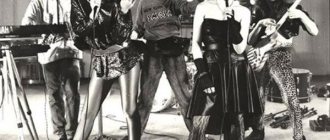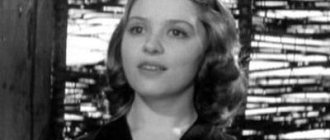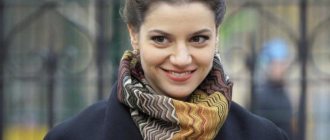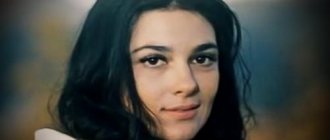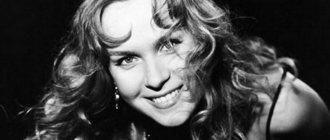Despite the fact that Svetlana Bezrodnaya celebrated her 85th birthday, she is still energetic and doing what she loves. Together with her team, the conductor visited the best concert venues in the world, but she often refused to tour abroad and dedicated her work to her compatriots. Svetlana Borisovna considers it her duty to support people living in hot spots; musicians of the Vivaldi Orchestra not only give concerts, but also bring humanitarian aid to those in need.
She received the love and attention of the general public thanks to her brainchild, which appeared in her creative biography 30 years ago. During this time, the team began to work in several directions; musicians included Russian songs, dance music of the 50s of the last century, jazz and even rock and roll in their repertoire.
Bezrodnaya did not immediately find her female happiness; Having gone through humiliation and pain, she became strong and wise, and only then began to prove that she was also a person and, moreover, talented. Only after 50 years did the People's Artist of Russia improve her personal life and meet true love. There is absolute harmony between her and her husband, and they even think in the same direction.
Childhood spent in a “golden cage”
The future violinist (her surname at birth is Levina) was born in 1934 in the village of Barvikha, Moscow region. Her early childhood years were spent in the Barvikha sanatorium, as her father, Boris Solomonovich Levin, served as Joseph Stalin’s personal physician, and also monitored the health of the entire party apparatus. Her mother, Irina Mikhailovna Shepshelevich-Lobovskaya, pursued a singing career. Famous people often came to the sanatorium, among whom was Korney Chukovsky. The writer loved to communicate with the baby and at the same time managed to help her mother, who could not feed her. Chukovsky read his famous poems to her, and Sveta, with her mouth open, listened.
Soon the whole family settled in a house located a stone's throw from the Kremlin. The future conductor could not choose her own friends; she could only be friends with the children of high-ranking officials. Her parents had close contact with the families of Khrushchev, Konev, and Chuikov, which is why the girl often visited their home and was friends with their children. Despite his privileged position, my father still did not escape the camps; they came for him in the fall of 1952, and in the spring of the following year Stalin passed away.
During her school years, Svetlana attended music lessons and played the violin. She also practiced rhythmic gymnastics, especially focusing on apparatus such as the balance beam and rings. By the age of 13, the young violinist was able to achieve good results in this field, winning the title of Master of Sports. But soon she had to make a choice between music and sports, because one day during training a music teacher saw her, who informed her parents about it. After graduating from school, the girl became a student at the Moscow Conservatory.
Quotes
“Bright talent and sincere love for music helped you reach the heights of mastery... The performances of your famous Vivaldi Orchestra are invariably accompanied by success and incessant applause. And the group’s diverse repertoire - chamber and symphonic works, works by classics and modern composers - evokes genuine admiration among connoisseurs of beauty.”
.
President of the Russian Federation D. A. Medvedev
— www.meloman.ru/?id=662
Creation of a women's orchestra
Having received her education, Bezrodnaya joined the creative team of Mosconcert, where she performed as its soloist. Then she got a job at the Central Music School and began teaching children to play the violin, devoting more than twenty years to this matter. The violinist's students were able to achieve considerable victories and often became laureates of prestigious international competitions. However, soon a difficult period began in Svetlana Borisovna’s life; she felt lonely and unwanted. By that time, the artist had not played the violin for many years, but despite this, she decided to create an orchestra consisting only of women. The USSR Ministry of Culture did not refuse her and even praised her for this idea.
Soon the Vivaldi Orchestra was assembled; its first composition was made up of students and graduate students of the conservatory from different republics. At first they had to rehearse on the territory of the Belorussky railway station depot, and then Vladimir Vasiliev came to their aid, who helped them develop their career and became their first stylist. Soon the Ministry sent the Vivaldi Orchestra to a concert in Germany; then they traveled throughout the Soviet Union, visited European countries, and soon reached America. For the first year, Bezrodnaya was almost never at home and spent all her time on tour, but despite her fatigue, she was happy for the first time in many years.
The orchestra staged its first performance, entitled “Songs of the Unconquered Power,” in the Tchaikovsky Hall, timed to coincide with the 60th anniversary of the Victory. It successfully intertwines various musical styles and types of art. During its existence, the group took part in the creation of musical programs and performances, such as:
- "Three stories of love and loneliness";
- "Masquerade without masks";
- "Splashes of champagne";
- "The Loneliness of Don Juan";
- “Ball after the battle” and others.
Notes
- [www.meloman.ru/?id=662 Bezrodnaya Svetlana – Moscow State Academic Philharmonic]
- [www.tatar-inform.ru/news/2009/02/12/153881/ The famous violinist Svetlana Bezrodnaya celebrates her 75th birthday]
- [www.biletexpress.ru/actors/434/abt.html Svetlana Bezrodnaya - Actors, directors, musicians - theater agency BILETEXPRESS.RU]
- [www.vashdosug.ru/persons/11384/ Svetlana Bezrodnaya - biography, photographs]
- [mkrf.ru/press-tsentr/novosti/ministerstvo/deyateli-kultury-rossii-v-podderzhku-pozitsii-prezidenta-po-ukraine-i-krymu Russian cultural figures - in support of the President’s position on Ukraine and Crimea] // Official website of the Ministry of Culture of the Russian Federation
Long road to happiness
The artist’s first family appeared while she was still studying at music school. Her future husband, violinist Igor Bezrodny, was her teacher. A whirlwind romance arose between them, and soon the 16-year-old girl found out that she was pregnant. One evening, the musician took the student to his home, and then called her mother and said that she would not come home, as she would soon get married. As a tenth-grader, Svetlana first gave birth to her son Sergei, and then took school exams. The lovers went to the registry office only after she passed her first exam.
According to the violinist, she was raising her son, and the boy raised her. Having spent her childhood in a “golden cage,” she again found herself in an environment where she was looked after and decisions were made for her. The family lived with the husband’s mother, who took care of everyday life and housekeeping. At that time, Bezrodnaya abandoned her concert activities at the Mosconcert and was as if in a dream. Her husband had been her favorite person for a long time; in addition, she respected him as a bright personality and an outstanding violinist. The first marriage lasted almost 18 years, and then the couple separated. The reason for this was that the conductor met a new love and gave herself entirely to this feeling. She still feels guilty that she left her husband, and when he died, Svetlana Borisovna organized a concert dedicated to his memory.
The artist’s second husband was Vladimir Spivakov, who was the complete opposite of her ex-husband. Now she did everything for her loved one and was completely subordinate to his interests. It was thanks to her participation that the “Moscow Virtuosi” orchestra was once created. This period in Bezrodnaya’s personal life was also not the best, but it was then that an internal protest began to arise in her, pushing her to a new stage.
At the age of 50, the violinist not only took up active creative activity, but also got married for the third time. She met her future husband, journalist Rostislav Cherny, at a Stern concert, where an American friend invited her. They sat in the 12th row, and behind Svetlana Borisovna was her future chosen one, who immediately drew attention to her. During the intermission, it turned out that they had mutual friends, and then they began to communicate.
In the photo Svetlana Bezrodnaya with her husband Rostislav Cherny
Their family happiness has lasted for more than ten years. The conductor is sure that her husband was sent to her by fate, because only with him she found harmony and feminine happiness. Now Cherny is its producer and is involved in all the orchestra’s projects. Often, even at home, they talk about work and new projects, and this is great because the spouses look in the same direction and have common interests. Their home is often crowded, but they always welcome guests with whom they have something to discuss. The artist’s son, like his star mother, started a family quite early. Sergei followed in the footsteps of his parents and became a musician: he performs in the Moscow Virtuosi orchestra.
About father
— How did you react to the death of Stalin?
— It all happened on March 5, the same day as Sergei Prokofiev’s departure. There is something mystical about this, isn’t it? Especially when you remember the difficult fate of the film “Ivan the Terrible” with the brilliant music of Sergei Sergeevich...
The great composer was buried so quietly that no one noticed.
As for Stalin, in our house they didn’t curse him, but they didn’t cry or die from grief either.
Dad was pulled out of the Gulag on the orders of Khrushchev and Malenkov. Mom often talked with Nina Petrovna, Nikita Sergeevich’s wife, and she said that her husband personally gave the command to find doctor Levin. Dad was valued in the Kremlin; he was a great specialist.
Dad could easily have died in the camp. The chief prisoner saved him from probable death... what do they call them correctly?.. by those watching?
— Godfathers, probably.
- Maybe. I don’t know, I don’t speak criminal vocabulary. In a word, a man named Ibrahim, seeing his father who arrived in Taishet, essentially naked and barefoot, said: “Don’t touch the doctor, provide everything he needs.” And dad was given a padded jacket with felt boots, he was able to spend the winter in the Siberian taiga. I am ready today to bow at the feet of Ibrahim if I meet him in the next world...
Dad returned home unexpectedly. The doorbell rang and I opened it. Father stood on the landing in worn-out soldier's boots and a long, worn overcoat. He stood and smiled at me with his toothless mouth. But dad was a little old. He was born in 1901. But the time spent in the camp left its mark.
— Did Boris Solomonovich tell you about the zone?
- Never! He didn't like talking about himself at all. Although he was not an office doctor, he flew to the partisans behind the front line and suffered frostbite on his feet during the war. He didn’t complain, much less try to seem like a hero. He lived modestly and worked honestly. At the same time, the talent was incredible!
After returning from the camp, he was offered to be reinstated as the head physician of Lechsanupr. Dad refused. Flatly. Instead, he essentially created the Institute of Balneology from scratch, becoming its founder. Another brainchild is a sanatorium in Dorokhovo.
Once I was invited to give a concert at the 4th Main Directorate of the Ministry of Health, the former Medical Directorate of the Kremlin. I came to the building on Granovsky Street, now Romanov Lane, saw a portrait of my father in the reception area, apologized and left. I couldn’t be there, I thought: “Since dad didn’t come back to you, I won’t play.”
— Is it true that there was a moment when you didn’t want to pick up the violin?
— After the conservatory, I didn’t touch the instrument for a long time. Fifteen years, if not more. This is due to certain circumstances of my personal life, I don’t want to dredge up the past now. In short, I didn’t find support for my endeavors in my family and closed myself off, deciding that I would never play on stage. I even donated a violin; it was the work of Nicolo Galliano from the funds of the State Collection of Unique Musical Instruments. I only kept the bow for myself. I always act categorically: when you leave, leave.
By the way, I still play the Galliano violin now, but differently. At one time there was Amati, but I’m used to larger instruments, although the master is certainly a genius, the first of a galaxy of great Italians - Stradivari, Guarneri, Testore...
Interesting facts from the life of Svetlana Bezrodnaya
- During her student years, she did not travel by public transport, but preferred to dash around on a moped. From the age of 15, the violinist already drove a car herself.
- Bezrodnaya does not like to attend social parties and has no desire to communicate with high-ranking officials, much less curry favor with them. But for the sake of the interests of her team or to get some money for him, she can forget about her own pride.
- Svetlana Borisovna loves to “juggle” styles and genres, combining what is often incompatible. So, in 2001, she came up with the idea of merging classical and rock together, as a result of which the rock group “Va-Bank” and the “Vivaldi Orchestra” performed on stage. The audience literally blew up the hall, loudly applauding the artists.
- In 2020, she and the Vivaldi Orchestra went to Donbass for the first time, and now the conductor’s name is on the “Peacemaker” list. But she doesn’t worry about this, because the main thing for her is to be where people feel bad.
Personal life
At the age of 16, Svetlana married her teacher Igor Bezrodny. From him she gave birth to her son Sergei. Now he is a famous pianist, a soloist in two orchestras under the direction of Vladimir Spivakov, Svetlana’s second husband. She divorced Igor after 18 years of marriage.
The violinist’s third husband, Cherny Rostislav Borisovich, was an international journalist. For more than 30 years he wrote for the newspaper “Soviet Culture” and headed the foreign department. After his marriage to Bezrodnaya, Rostislav became the producer of the Vivaldi Orchestra.
Now Svetlana Borisovna continues to tour with her band. For her services, she received the title of Honored Artist of the RSFSR in 1991, and in 1996 she was recognized as People's Artist of Russia. In 2008, the woman became a laureate of the National Russian Ovation Award in the Classical Music category.
About memory
— Was it a tour?
— Participation in the international festival in Hamburg, held in the premises of St. Nicholas Cathedral. This is the calling card of the city, a huge temple, one of the largest in Germany. In the program we included Vivaldi’s “The Four Seasons,” which was natural, Tchaikovsky’s “String Serenade,” and it seemed logical given where the orchestra came from, and, finally, most importantly, the Chamber Symphony “In Memory of the Victims of Fascism and War” by Shostakovich. It is also called String Quartet No. 8.
The program was supposed to be submitted in advance to the Ministry of Culture and the State Concert. What started there when they saw Dmitry Dmitrievich’s work! I almost got killed! They say, why are you provoking an international scandal? And I sincerely did not understand what my crime was. Was the symphony written by our great compatriot? Yes. Was the dedication made by the author himself? Yes. What questions do you have for me? Moreover, after the war, Shostakovich visited Auschwitz. I made a special trip to tune in to the right wavelength to write a tragic symphony. This is the only work created by the composer abroad.
In short, she categorically refused to change the program. She insisted on her own opinion. I have a stony character. To mom.
We were given a press conference in Hamburg. I warned: I will play Shostakovich. Get ready!
I came to the cathedral early, before the rehearsal. I look: a black crucifix hangs on a white wall. I decided to stand facing the orchestra and Christ. I couldn’t see the hall behind me. Then I found out that more than five thousand people had gathered.
In the first part they played Vivaldi. The public received us very favorably.
After the intermission they performed Tchaikovsky's Serenade. They clapped again and shouted “Bravo!”
And then we gave a symphony... It consists of five movements. In the scherzo the tempo is frantic and the finale is terrifying. You get the feeling that you can hear the bones of burned concentration camp prisoners rattling and the doors of the crematorium ovens slamming. In reality, these sounds do not exist, but you feel them so clearly that horror chills you to the bone. Shostakovich wrote brilliantly! Well, we tried our best and didn’t spare the colors.
She told the orchestra that no one should dare take the bow off the strings at the end. And so we play the last note, I stand and look at Christ in dead silence. There's not a sound behind me. The church is silent. I think: “These are thick-skinned! Didn’t it really get through?”
This lasted for a minute or a minute and a half. I won't say more precisely. Time flows differently on stage.
Then suddenly there was a bang from behind. But not in the palm of your hand. As if something had fallen. A moment later the sound was repeated. Then again, again, again. I couldn’t understand what was happening, I turned around and saw that the hall was on its feet. The folding backs of the seats in the church slammed.
After this the ovation began.
I didn't cry. I held back, although the tears were choking me. And she didn’t bow. She waited until the applause died down and left.
And the next day, a review appeared in one of the central newspapers in Germany: “Bezrodnaya forced the Germans to repent.”
Biography and personal life of Rostislav Cherny
Rostislav Borisovich Cherny is a bright personality of the Soviet Union and modern Russia.
Born March 2, 1948. A journalist by training, Rostislav Borisovich has been the producer of his wife Svetlana Vladimirovna Bezrodnaya for a long time. The couple met at a concert of the American violinist Stern. Despite the lack of mood and pain in the ankle joint (not long before, the violinist twisted her ankle while walking off stage in uncomfortable shoes), Bezrodnaya still went to the concert.
Despite the lack of mood and reluctance to leave the house, fate still managed to do its job: during the intermission, Rostislav Borisovich was introduced to her
It turned out that he had been sitting in this hall all this time and drew attention to the beautiful violinist
For Svetlana Vladimirovna, he became the third husband, and, according to her, this marriage is a real gift of fate. Rostislav Borisovich and his wife understand each other without words and thank God that everything happened exactly like this.
Thinking alike, understanding at a glance - this is how the couple characterizes their union. Despite the fact that the couple does not have children yet, they feel the happiest in this marriage.
Although Rostislav Borisovich himself is in the shadow of his wife, his personality deserves attention. He worked for more than 30 years at the newspaper “Soviet Culture” and was aware of everything that was happening in the creative circles of the USSR. It is not surprising that by the time he met Bezrodnaya, he knew almost everything about her, and this only contributed to their acquaintance.
And despite his success in his career, with his marriage to Svetlana Vladimirovna, Rostislav Borisovich decided to leave journalism and start producing his wife’s concert and artistic activities.
In such a symbiosis, the couple is engaged in professional activities to this day: Svetlana Bezrodnaya serves as artistic director, and Rostislav Cherny - organizational.
As a manager, Rostislav Borisovich works at the State Academic Chamber Vivaldi Orchestra. His position is producer. His wife can calmly allow herself to concentrate on the artistic component and creativity, while Cherny is engaged in not the most noticeable, but very important things.
The Vivaldi Orchestra successfully conducts concert activities under the direction of the spouses. This very well shows the harmony of their relationship: a harmonious life in marriage allows them to create a smoothly working mechanism through joint efforts.
Rostislav Borisovich is the co-author of the musical and literary play “Masquerade without Masks,” which was successfully staged in the 2011-2012 season. For it, little-known music of Soviet classics was used - Prokofiev, Shostakovich, Khachaturian. One can only guess how many other projects Cherny took part in.
After all, constantly living and being close to his wife, he inevitably influenced her ideas, gave new ideas and shared his emotions, which simply could not help but affect what ultimately came out of Svetlana Vladimirovna’s bow and baton.
Nevertheless, Rostislav Borisovich copes well with both the responsibilities of a husband and the responsibilities of a producer. He subtly, being behind the brilliant orchestra and being constantly unnoticed by the audience, with his activities forms the foundation of the “Vivaldi Orchestra”.
And such a difference in public recognition does not in the least interfere with the union of Svetlana and Rostislav. On the contrary, each spouse feels in his place. This is probably the secret of their happy marriage, which means that Rostislav Borisovich Cherny deserves respect for his personality.
Childhood and parents
The future star of classical music was born on February 12, 1934 on the territory of the Barvikha sanatorium, where she lived almost until she entered secondary school.
Since the violinist’s father was J.V. Stalin’s personal doctor, the family subsequently moved to the Kremlin. The artist’s mother was a former famous opera singer who lost her voice due to nervousness.
By the way, Bezrodnaya’s father graduated with honors from the conservatory in violin in his youth, but later retrained as a doctor - musicians then had less opportunity to support their family.
Svetlana Bezrodnaya in childhood
The famous Kremlin doctor's clients included all the party bosses and a huge number of cultural figures close to power. Therefore, the girl had everything that other Soviet children did not know about. She could calmly improve her musical talent in a prosperous atmosphere of universal love and family happiness.
